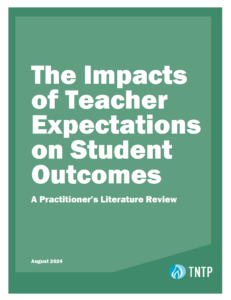When I was a first-year teacher, my classes were fairly chaotic. My students often talked over me, my transitions took twice as long as they should, and I barely got through all of my lessons. It was a long time before I could effectively manage a classroom, which I learned to do mostly by watching other teachers, mimicking what they were doing, and adjusting as I figured out what worked and what didn’t. Every time I’m with one of our Teaching Fellows and I see how they demand student attention, execute routines and maximize their time after practicing our Fast Start skills, I know that my first year could have been much better.
I was reminded of that painful experience again this week, when the National Council of Teacher Quality (NCTQ) published a report on classroom management training for future teachers, as a follow-up to its recent damning report on the nation’s teacher preparation programs. For this new paper, NCTQ identified five management strategies with the strongest research-based evidence behind them, and examined how thoroughly prep providers trained teachers in these critical skills.
The list of what NCTQ calls “Big Five” skills is familiar to us at TNTP: establishing rules, building structure and routines, praising positive behavior, addressing misbehavior and maintaining student engagement. And what NCTQ found is not surprising: While almost all teacher-prep programs touch on classroom management in one way or another, few give it focused attention and teach all of the “Big Five” skills. Instead, the majority of institutions encourage teachers to develop their own “personal classroom management philosophy.”
In itself, that’s a disturbing finding, especially in light of the organization’s earlier conclusion that prep programs across the country widely lack direction and discipline in how teachers are trained. But what particularly caught my eye was that only one-third of the programs NCTQ reviewed require novice teacher candidates to actually practice classroom management strategies, and only 10 percent provide novice candidates with direct feedback on their work. To me, this is the strongest piece of evidence showing what NCTQ calls “the false promise of instructional virtuosity”—or in layman’s terms, the assumption that if you deliver highly engaging lessons, that’s classroom management enough. Oh, how I wish that was true!
We’ve spent the last few years overhauling our pre-service training approach—in part because we realized that our former theory-focused training approach wasn’t consistently preparing highly effective teachers. A huge part of this was elevating classroom management to the place it deserves in a novice teacher’s preparation—front and center—and then reinforcing Fellows’ work on those key skills through hands-on practice and coaching.
In our programs now, during an intensive five- or six-week summer training session, teachers attend more than 70 hours of classroom management training before they ever set foot in a classroom. That training includes skill-building exercises in each “Big Five” strategy, through an explicit focus on Doug Lemov’s Teach Like a Champion techniques. Teachers are required to progress toward mastering practical strategies, by practicing techniques like speaking in a “strong voice” repeatedly “off-stage” with their peers, and implementing near-daily targeted feedback from their coaches.
Of course, all of this talk about classroom management can obscure the point. Classroom management is not an end, but a means to an end. It is the foundation for an engaging, joyful class where students can explore and master rigorous lessons. As we focus on implementing new Common Core standards, this report is a warning shot that we may never get there if novice teachers don’t learn the basics of management first.








